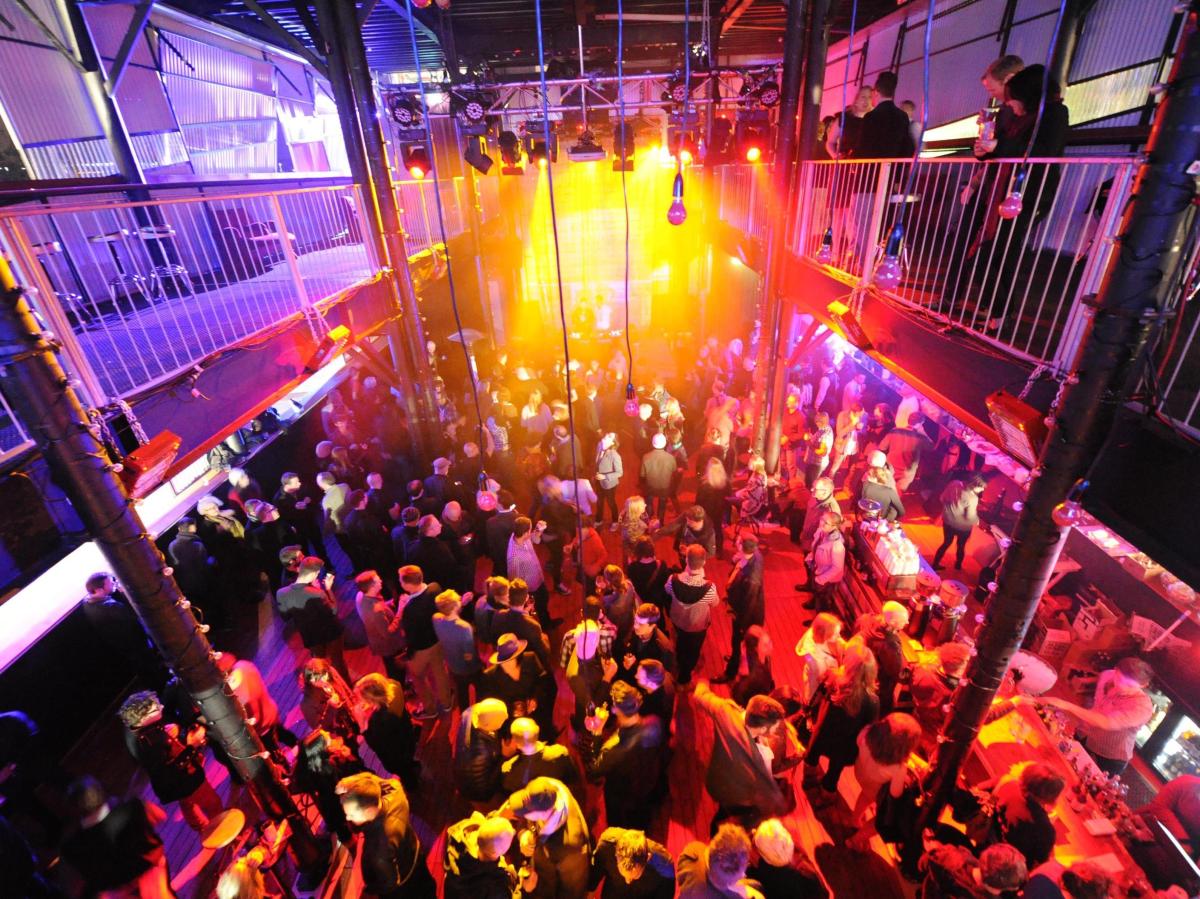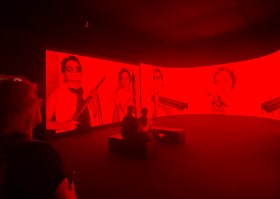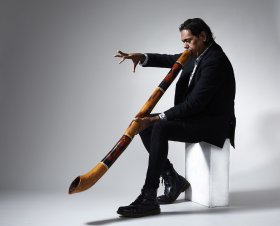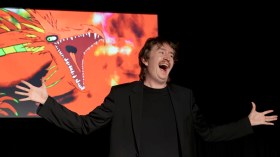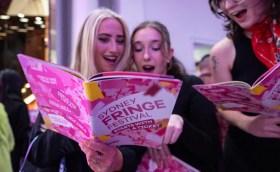Melbourne Festival Hub, photo by Lim Lee via www.strutnfret.com
Whether you’re an artistic director, arts journalist, passionate festival-goer or professional critic, committing to a major arts festival can be exhausting work. How does one stay fresh, faced with several solid weeks of art and entertainment? Do you mix up your art forms and genres in order to stay alert? Book yourself a night off every week, or a regular visit to your favourite masseur for the festival’s duration? Swear off alcohol or obsess about eating well? Start every day with vigorous exercise or a really strong coffee?
Some of Australia’s most experienced consumers of culture give us their personal tips on staying alert and enjoying the festival experience to the full.
Jonathan Holloway, Artistic Director
‘I love Festival Fatigue. You have to jump into festivals with both feet, book more than you have energy for, spend money more than you can afford, commit to more than fits into your schedule. Finishing a festival without fatigue would be like ending a football match without aching legs, or conducting a Beethoven symphony without needing an osteopath’s appointment: if you’re not fatigued, you haven’t played hard enough.
Festival Fitness on the other hand is not about avoiding fatigue, rather it is about recovery rate, how long you need after one festival before you are ready to jump into the next. I reckon I can currently do about nine festivals a year, as long as I only have to be captain of the team for one of them.
Festivals are the extreme sport of the arts. From the first moment to the last there is no opportunity to regroup or change tactics, you just have to push on and try not to injure yourself.
Personally, I use the energy of the festival and those around me to keep going. I take every opportunity to eat a meal off a plate rather than canapés off a tray. I have one short day a week (maximum 12 hours work on that day). My year-round rule is to try not to see the sunrise at either end of my day. Oh, and getting drunk is one of the biggest dangers, closely followed by staying sober.’
Jane Howard, theatre critic and blogger
‘Your town isn’t home to the second largest fringe festival in the world without a collective Festival Fatigue taking over the entire city. As much as we as a city have figured out how an arts festival can seep into every nook and cranny of a city, we have perhaps also figured out how to collectively combat festival fatigue: hibernate. Late March through to at least mid-April, Adelaide and its residents go underground: we need it. Recuperation takes swapping nights out for nights in, swapping beers for cups of tea, swapping festival food stall dinners for home cooked meals with lots of fresh vegetables. And getting overly invested in a terrible soapy or procedural US TV series never hurt anyone.’
David Sefton, Artistic Director
‘Obviously the main thing about festivals is that no matter how insanely busy you become for the duration, that duration is a fixed term. And adrenalin will see you through the three weeks – it’s inevitably afterwards that you get sick!
As for survival tips I’d say always say yes when offered food and try and remember to say no when offered drink – at least some of the time. Try and sleep at some point in every 24 hour period, grab quiet moments when you can (my walk to work is what will probably keep me sane). And a bit of perspective helps – it’s easy to immerse yourself in Festival Frenzy to the extent that the tiniest glitch – and they always come – is the end of the world.
I find stopping for five minutes and reading the world news, although not often cheering, can help enormously to put things in perspective.
And succumbing to the odd cocktail is also highly recommended!’
Elissa Blake, theatre critic
‘Every year I swear off alcohol as the key to staying alert during a festival. I want to feel excited and not tired. I also try to get lots of sunshine and fresh air. If I’m going to spend that much time inside a dark room watching theatre, I’ll need to balance that with some sunshine. So I spend time in parks – just lazing around is enough, nothing too vigorous, no jogging.
The other benefit of getting some sunshine is it clears your head. I think you need a palette cleanser between shows. Going for a walk and getting some good food helps. During a festival, there is so much to absorb that I tend to cut down on other things such as books, TV, films, internet. It’s easy to get overstimulated.
And yes, mixing up the program so you see dance, theatre, visual arts on different days seems like a good idea. But then again, gorging on non-stop theatre for a week is fun too.’
Lieven Bertels, Festival Director
‘Festivals can indeed be exhausting, despite the constant adrenaline rush for us as organisers. In the cultural sector there’s of course a zillion opportunities to drink bubbles and wine, or eat canapés all day, and as I don’t seem to find time to do any serious sports I’ve decided to avoid alcohol and tray food altogether during my own festival. It’s perhaps a tad ungrateful towards our lovely wine, beer and food sponsors, but I’m more than happy to enjoy their products outside the festival period.
And of course I’m a great believer in a power nap from time to time. I’m an easy sleeper, I can have a nap pretty much anywhere, and I often carry my earplugs and sleeping mask with me – Top Tip: in a theatre backstage area, find the corner where they store unused theatre curtains – folded curtains make for a great bed to have a nap between rehearsals and evening performances. A double espresso with one sugar and off I go again. And if all else fails, you can always apply the trick I saw the Dutch Queen Beatrix use: hold your hands together with your fingers pointing up and your elbows locked on your armrests, like in a medieval prayer painting. Plant your fingernails into your chin – if your head starts to nod and sag, your sharp fingernails will remind you to stay awake. But of course I won’t need that in my own festival, with all the exciting stuff we’ve got lined up.’
Brett Sheehy, Artistic Director
‘Don’t stop. Stopping is fatal and you’ll dwell on what’s gone wrong, will forget all the good things, will lose the élan, buoyancy and support your artists expect and need from you, and who knows what fatigue-friendly ailments might strike in a moment’s stillness. So keep moving. And pace yourself – it’s only a short period, but it’s still a marathon, and sprinting to the Hub on weekend one to go crazy with your first raft of artists ain’t fair to the next 200 lobbing in over the coming two weeks. There’s time enough for all-nighters and recovery at the end.’
Cameron Woodhead, theatre critic
‘I’m not sure how you’re supposed to stay fresh through any major arts festival. I’ve never managed it. I mean, exhaustion is part of the point isn’t it? The mainstream conflation of art and entertainment seems to have misled people into thinking that art has their best interests at heart, that it’s all just a bit of harmless diversion. It doesn’t, and it isn’t. Most art worthy of the name makes demands of you – sometimes it will break you and re-fashion your view of the world, sometimes it just makes you want to run screaming from the room. The important thing is to be as present and concentrated as you can while experiencing it. As a festival veteran you’d think I’d have a range of viable tactics for doing that, but I only have two: the morbid overconsumption of bowel-bashingly strong lattes, and a capacity to utterly forget what happened last night.’
John Bailey, arts writer
‘I used to take pride in my supposed festival fortitude until last year’s Comedy Festival saw a minor cold get so bad that a vessel in my ear blew and I was left partially deaf for three months. There was a lesson in that. Now I’ve learnt to slow down. If I find fatigue setting in, I try to listen to it. Have a night in. If you’re pushing on despite the protests of both mind and body, you’re not doing an artwork any favours. Art isn’t a duty. Then again, you also need to go into a festival knowing that you’ll miss something everyone will end up raving about, and just deal with that. There’s more great stuff out there than we could ever experience in a lifetime, and that should be a source of joy, not disappointment.’

